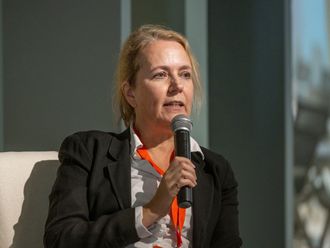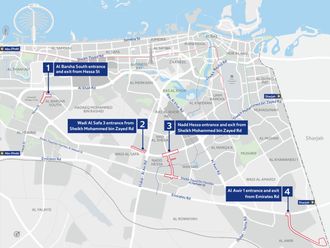
Dubai: If there ever was a good time to switch jobs in the UAE it might be now. Recruitment freezes have started to thaw out and the dreaded No Objection Certificates (NOCs) are no longer a deterrent.
Top recruiters and management consultancies say the job market is finally looking up, riding on the back of improved performances by companies, merit-based salary hikes and a positive outlook for the future.
"The demand for hiring has gone up by 40 per cent," said Chris Greaves, Managing Director of Dubai-based Hays Recruiting Experts Worldwide.
He should know. Since January 2011, his company has registered openings for over 2,000 jobs from various clients.
The upswing is also reflected in a massive survey covering over 200,000 UAE-based employees in 488 companies across 16 sectors by global management consultancy Hay Group. There were 37,000 new recruits in 2011 as against 25,000 in 2010, the compensation and benefits survey found.
"The recruitment was primarily for sales and marketing roles. This new wave can be attributed to an improvement in business performance over last year and because new recruits can be sourced at below the average market rate," said Vijay Gandhi, Hay Group's Director of Reward Information Services.
"We're on the up and are seeing the start of a recovery. There has been a sustainable increase in recruitments since September," said Mike Hynes, Managing Partner of recruiting agency Kershaw Leonard.
While the new NOC rules (see box) may not have directly stimulated job demand or growth in recruitments, it has hugely affected the psyche and movement of prospective candidates. Now more and more UAE-based expats are entering the job market.
Till January this year, all expatriates seeking to switch jobs required a no-objection certificate from their previous employer. This was done away with by the Ministry of Labour early this year.
"What has changed is that people who were stuck in certain jobs have started looking around. And this has brought more candidates into the market," said Hynes.
"Employees have more flexibility to move between jobs. The market is more open and we have a situation which is fair to both employers and employees," said Gandhi.
Advocate Ebrahim Al Shaiba of Al Bahar Advocates and Legal Consultants said the new NOC rules have also helped bring down the number of labour disputes. "There could be a 40 per cent drop in such cases."
He pointed to cases from the past where workers were arbitrarily dismissed or were frequently trying to change employers. Employers pressured workers because they could not change sponsors without an NOC from them. They would force workers to forfeit their rights in exchange for the NOC, he said.
Mustafa Zafeer, Senior Lawyer and Managing Partner at Mustafa & Almana Legal Consultants, said, "Non-payment of salaries or dues was common, especially during the economic slowdown. Employers often used NOCs as a measure to keep people back. But this is no longer the case."
He said legal rights of workers are well protected and cautioned employees against signing restrictive clauses with their sponsors.
One such clause pertains to limited contracts. As Al Shaiba explained, the NOC rule applies if an employment contract is for an unlimited period. But if the contract is for a limited duration and the employee violates the term, he will lose his labour rights. Also, the employer would be entitled to apply to the Ministry of Labour to impose a one-year ban.
Apart from NOCs, Emiratisation has also been a key market dynamic. HR consultancies said around 50 per cent of companies in the UAE plan to hire more local talent in the near future.
Dr Jasim Al Ali, Director of Human Resources at the Department of Economic Development in Dubai, said the private sector should employ more Emiratis. "We have around 76,000 Emiratis working for the Dubai Government departments," he said. "While there will always be room for more, the private sector must also take them on board."
Shedding more light on the issue, Gandhi said, "Our data shows that Emiratis are paid 33 per cent more fixed pay than the general market. The biggest gap between nationals and non-nationals is for entry level positions where demographics of the country mean young Emirati talent is scarce."
Salaries up
According to the Hay Group survey, salaries in general went up by five per cent on average over the last 12 months, with nationalities, seniority and location within the emirates all playing a role in determining pay rises.
But, Greaves said, the companies' growing intention to hire hasn't translated into a salary inflation. "At an individual level, candidates are moving jobs at the same salary or even taking a cut."
Gandhi said, "A new employee in the Emirates can expect to be paid six per cent under the market average. We are not witnessing layoffs any more apart from a few organisations in real estate [sector]."
Most recruiters believe that even with the expatriate workforce, employers will increasingly go in for local hires than contract them on expat salaries from abroad as it is considered less of a hassle and more cost-effective.
"We pay our employees the market rate," said Wayne Davies, Human Resources Director of GE, adding, "The only difference is that those on expat salaries enjoy global mobility and get to keep home benefits."
There are sharp salary differentials between Dubai and Abu Dhabi, with employees in the capital being paid an average of 20 per cent more. The Hay Group said this is largely due to housing allowances which are 27 per cent higher in Abu Dhabi than Dubai.
However, a recent Consumer Confidence Index survey showed that 62 per cent of UAE residents feel their current salary is not in line with the cost of living. But 54 per cent believe their financial position will improve in a year's time.
The Hay Group said employers are faced with the challenge of escalating benefits costs like education allowance and medical insurance. "They are being pushed to pay more, but employees only see the same level of benefits," said Gandhi, adding that education costs alone have gone up by 20 per cent in the last 12 months. In contrast, education allowances have risen by just eight per cent.
Looking forward to the next 12 months, the Hay Group forecasts pay increases of 5.2 per cent. This is evidence of the stabilising pay market as organisations are now in a better position than two years ago to forecast business performance.
"The employment landscape is definitely poised to improve," said Greaves.
NOC and Labour Ban
From January 1, 2011, the minimum period of employment for which a labour ban is not imposed is two years. No Objection Certificates (NOCs) are not required in such cases. But expatriate workers who quit their jobs before completing two years of service still face a six-month labour ban.
Ebrahim Al Shaiba of Al Bahar Advocates and Legal Consultants said the ban can be lifted if the new employer offers the candidate an appropriate salary. The minimum salary requirements to avoid the ban are as follows:
- High school diploma holders: Dh5,000
- Diploma holders: Dh7,000
- Bachelor degree holders: Dh12,000
Changing times
- Recruitments rise by 40 per cent in 2011
- Abu Dhabi employee salaries are 20 per cent higher than Dubai salaries
- Emiratis get 33 per cent more pay than expat workers
- 50 per cent companies plan to hire Emiratis in coming months
- Salaries go up by five per cent in 2011
- Salaries expected to increase by 5.2 per cent over the next 12 months
- 37,000 new recruits in 2011 in uae compared to 25,000 in 2010:
Hay group survey











